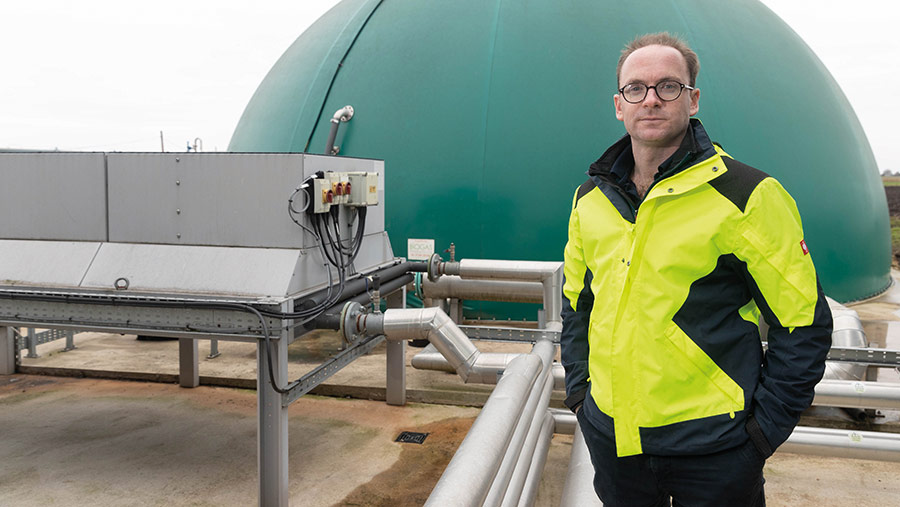Restructuring and tech are transition priorities for Lincs farm
 © Tim Scrivener
© Tim Scrivener Restructuring the business, pursuing technical improvements and keeping long-term options open are priorities for Lincolnshire farmer Alistair Hall-Jones.
Getting the business in the best shape possible to enable decisions to be made as post-transition opportunities become apparent is a key focus.
The 680ha farm – sandwiched between the Lincolnshire Wolds and the Fens around the village of Toynton St Peter – comprises two pig units, arable enterprises and a 250kW/hour anaerobic digestion (AD) plant.
See also: Why regen farmer opted for a rotation with no break crops
Farm facts: RH-J Farms
- Farm size 680ha – 430ha owned; 250ha tenanted
- Enterprises Combinable crops, vining peas, sugar beet, forage maize, plus 900 sows
- Annual rainfall 700mm.
- Soil Black fenland, silty clays, sands
Mr Hall-Jones came back to the family farm 13 years ago after a spell working for a property firm in London.
“Nobody knows exactly what the post basic payment world will look like, so there is an element of holding fire, but you can’t sit around waiting for things to happen,” he says.
“All our land is being utilised in the best way it can be right now, and we’re pursuing practical and technical efficiencies, in tandem with some restructuring.
Strong position
“From the outside, it might look like we’re not changing, but we’re consolidating and aggressively repaying borrowing, so we will be in a strong position in five to 10 years’ time if we want to raise money for new opportunities.
“Money is relatively cheap at the moment so it would be tempting to delay paying back loans, but I don’t want to be caught out if the interest rates jump.”
This reorganising and drive to increase the business’s asset value has been made alongside efforts to get the right team in place, with 13 people currently employed.
Experience, attitude and communication skills are crucial criteria when recruiting.
It’s all about having the right people in the right roles – whether it’s the pig expert Mr Hall-Jones has brought in from Romania, the two 50-somethings who have been key members of farm staff for decades, or the raft of new young hires.
“If they have the right qualities, you have to invest in them and give them opportunities. It will be ever-more important to have positive, flexible people at this time of change.”
Transition goals
- Recruiting and retaining first-class staff
- Pursuing technical efficiencies
- Paying back borrowing
Finding efficiencies
The team’s prowess is helping find efficiencies. Smart soil sampling and analysis, combined with careful targeting of liquid and solid digestate around the farm, has brought fertiliser bills down, for example, meaning no phosphorus or potassium is now bought and only a little nitrogen has to be purchased.
“With fertiliser prices going through the roof this year, it’s highlighted the need to do this more.”
The arable enterprises generate about 20% of the total bottom line, with the pigs and the AD plant each contributing about 40%.
The three prongs of the business dovetail and help spread risk. “Right now, wheat prices are through the roof but we’re getting hammered on the pigs,” he says.
While the pig breeding and finishing operation, which sends nearly 22,000 head a year to Morrisons, won’t be directly affected by the phasing out of BPS, the team is acutely aware of how interlinked the different enterprises are.
“We can’t simply think we’ll absorb that loss across the whole business and we’ll be fine. We have to look at the whole business and be proactive.”
Carbon offsetting
This is especially important given new markets could develop with private sector money on offer for projects such as carbon offsetting, alongside government “public money for public goods” funding.
“We’ve got experience of environmental projects, which should stand us in good stead. We’re in a legacy HLS-ELS [Higher Level Stewardship/Entry Level Stewardship] scheme, which ran to 2020 and we’ve been able to roll it over for the past two years.”
The original motivation for installing a small AD plant in 2014 was to use the farmyard manure and slurry from the pigs and now, as well as providing power for the farm, it is “exporting” to the grid.
“Growing 200 acres of maize and using all our slurry and muck means we’re not dependent on anyone else – it’s a closed loop.”
Meanwhile, the Feed-in Tariffs subsidy in the AD plant – set to continue for another 14 years – means this is a reliable, regular source of income.
But Mr Hall-Jones is already thinking beyond that, and whether there could be opportunities connected to other technologies, perhaps integrating some hydrogen generation.
“We don’t have a single, groundbreaking long-term goal, but we’re taking lots of actions to put us in the best position possible for the future.”
Alistair Hall-Jones is one of our Transition Farmers. Join him as RH-J Farms strives to become financially and environmentally sustainable and overcome the challenges it faces over the next five years.
